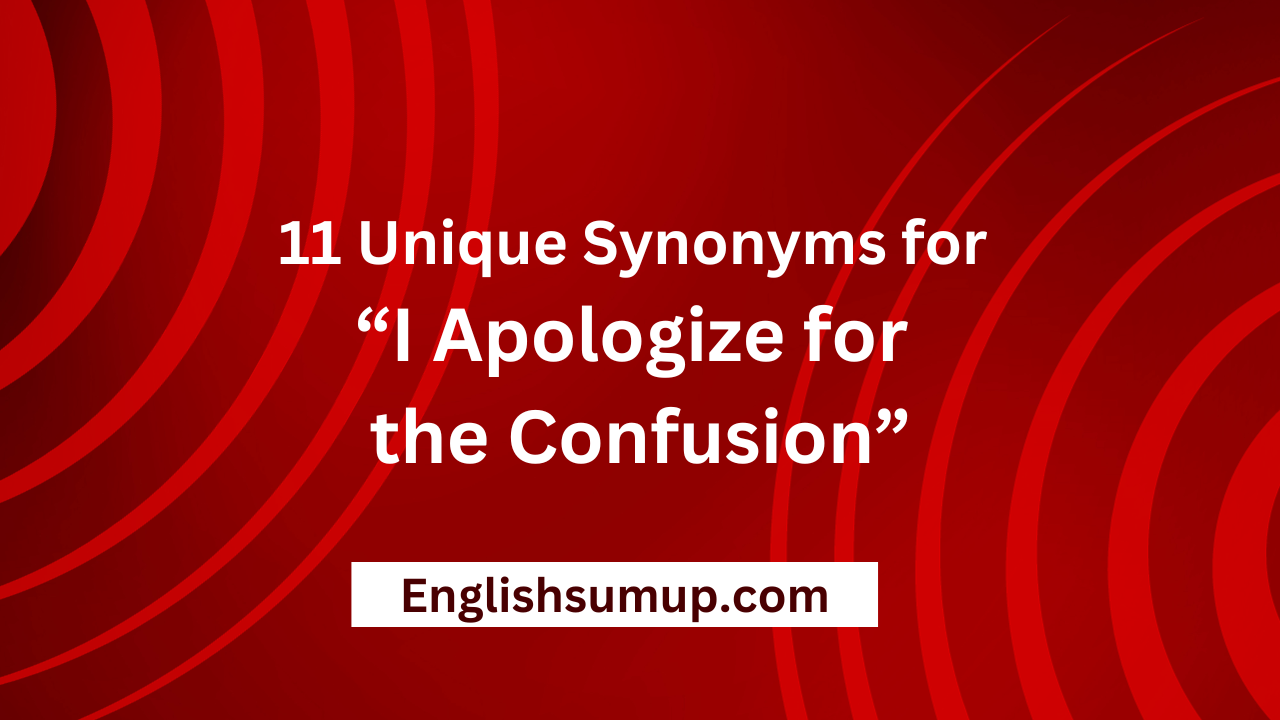Navigating “I Apologize for the Confusion” in email communication to steer clear of any potential misunderstandings is crucial in professional settings. However, the standard phrase “I apologize for the confusion” may feel a tad unprofessional or even peculiar.
The good news is, there exists a myriad of alternatives at your disposal.
Continue perusing to discover diverse ways to articulate your regret for any confusion in your emails, providing you with the flexibility to infuse variety into your communication.
Is It Professional to Say “I Apologize for the Confusion”?

In professional correspondence, expressing regret for any confusion is a courteous and vital aspect.
The phrase “I apologize for the confusion” fits seamlessly into formal emails, conveying your acknowledgment that any bewilderment was unintended.
This phrase, while not impolite, serves as a respectful means to communicate that there might have been a minor misunderstanding,
aiming to keep recipients well-informed and enhance comprehension.
Read this post also: 11 Unique Synonyms for “I Was Wondering”
Consider the following example to grasp the contextual usage of “I apologize for the confusion”:
Sub: Clarification on Our Recent Discussion
Dear Mr. Adams,
I apologize for the confusion. It appears we were both exploring different solutions to address the same issue.
Yours sincerely,
Bryan Mathews
For a more informal touch, you might consider a variation like:
Sub: Addressing Recent Confusion
Dear Bradley,
Apologies for the confusion. It was an oversight on my part, and I’m taking immediate steps to rectify the situation.
Best regards,
Martin Door
While “I apologize for the confusion” holds its professionalism, it’s beneficial to diversify your language. Continue reading to discover alternative ways to professionally convey apologies for confusion, providing you with a range of options to suit different contexts.
What to Say Instead of “I Apologize for the Confusion”

- I regret any misinterpretation that may have arisen.
- My sincere apologies for any haze in our communication.
- Please accept my regrets for any bewilderment caused.
- I’m sorry if our exchange left room for uncertainty.
- I apologize for any intricacies that might have surfaced.
- Allow me to express regret for any perplexity that ensued.
- I extend my apologies if there was any misunderstanding in our dialogue.
- I regret any ambiguity that may have arisen during our recent communication.
- My sincere apologies for any intricacies in our recent correspondence.
- Apologies if there was any uncertainty stemming from our recent exchange.
- I apologize for any misinterpretation that may have arisen from our recent discussions.
1. I regret any misinterpretation that may have arisen.
Expressing regret for potential misinterpretations is a diplomatic way to acknowledge any unintended confusion. This phrase communicates a sense of responsibility while maintaining a formal tone. Isn’t this the best alternate of “I apologize for the confusion”.
Sub: Clarification on Recent Discussion
Dear John,
I hope this email finds you well. I regret any misinterpretation that may have arisen from our recent conversation. It’s important to me that we are on the same page, and I would appreciate the opportunity to clarify any points of confusion. Please feel free to reach out, and let’s ensure our understanding aligns seamlessly.
Thank you for your understanding.
Best regards,
Devon
2. My sincere apologies for any haze in our communication.
Referring to communication as having a “haze” adds a metaphorical touch, indicating a lack of clarity. This phrase conveys sincerity and a genuine desire for a clearer understanding. Isn’t this the best alternate of “I apologize for the confusion”.
Sub: Addressing Communication Clarity
Dear John,
I trust this message finds you in good spirits. My sincere apologies for any haze in our recent communication. It’s crucial to me that our discussions are transparent and straightforward. If there are any points you’d like to revisit or clarify, please let me know. I appreciate your understanding and look forward to ensuring our future exchanges are crystal clear.
Warm regards,
Devon
3. Please accept my regrets for any bewilderment caused.
Using “bewilderment” adds a touch of formality while expressing regret. This phrase suggests a commitment to clarity and a genuine apology for any confusion. Isn’t this the best alternate of “I apologize for the confusion”.
Sub: Acknowledging Recent Misunderstandings
Dear John,
I trust this email finds you well. Please accept my regrets for any bewilderment caused during our recent interactions. Clear communication is essential, and I want to ensure we are aligned in our understanding. If there are specific areas that need clarification, I am more than willing to address them. Your understanding is highly valued.
Thank you for your time.
Best regards,
Devon
4. I’m sorry if our exchange left room for uncertainty.
This phrase combines a straightforward apology with an acknowledgment of potential uncertainties. It maintains a polite tone while expressing a commitment to clearer communication. Isn’t this the best alternate of “I apologize for the confusion”.
Sub: Clarification on Recent Correspondence
Dear John,
I hope this message finds you in good spirits. I’m sorry if our recent exchange left room for uncertainty. It’s essential to me that our communications are clear and concise. If there are any points you’d like to revisit or elaborate on, please feel free to let me know. Your insights are valued, and I appreciate your understanding.
Warm regards,
Devon
5. I apologize for any intricacies that might have surfaced.
Referring to communication as having “intricacies” conveys an acknowledgment of complexities. This phrase expresses regret while demonstrating a commitment to simplifying future interactions. Isn’t this the best alternate of “I apologize for the confusion”.
Sub: Addressing Recent Communication Complexities
Dear John,
I trust this email finds you well. I apologize for any intricacies that might have surfaced during our recent communication. It’s crucial to me that our interactions are straightforward, and I am committed to ensuring clarity in our discussions. If there are specific areas that require further explanation, please let me know. Your understanding is greatly appreciated.
Thank you for your time.
Best regards,
Devon
6. Allow me to express regret for any perplexity that ensued.
This phrase combines a formal expression of regret with a commitment to clarity. It acknowledges any perplexity that may have arisen and aims to rectify it. Isn’t this the best alternate of “I apologize for the confusion”.
Sub: Regret and Clarification
Dear John,
I trust this email finds you well. Allow me to express regret for any perplexity that may have ensued from our recent discussions. Clarity is of utmost importance to me, and I want to ensure that our communication is as transparent as possible. If there are specific areas that need clarification, please do not hesitate to let me know. Your understanding is highly valued.
Thank you for your consideration.
Best regards,
Devon
7. I extend my apologies if there was any misunderstanding in our dialogue.
This phrase combines a formal apology with an acknowledgment of potential misunderstandings. It conveys a commitment to fostering a clear and accurate understanding. Isn’t this the best alternate of “I apologize for the confusion”.
Sub: Apologies and Clarification
Dear John,
I trust this email finds you well. I extend my apologies if there was any misunderstanding in our recent dialogue. Clear communication is essential, and I want to ensure that our discussions are devoid of any confusion. If there are specific aspects that require further explanation, please feel free to communicate them. Your understanding is valued.
Thank you for your time.
Best regards,
Devon
8. I regret any ambiguity that may have arisen during our recent communication.
Expressing regret for ambiguity shows a commitment to clear communication. This phrase is suitable for formal settings where precision in understanding is crucial. Isn’t this the best alternate of “I apologize for the confusion”.
Sub: Addressing Ambiguity in Our Communication
Dear John,
I hope this message finds you well. I regret any ambiguity that may have arisen during our recent communication. It’s imperative to me that our discussions are crystal clear, and I am dedicated to rectifying any areas of confusion. If there are specific points that require clarification, please don’t hesitate to inform me. Your cooperation is greatly appreciated.
Thank you for your understanding.
Best regards,
Devon
9. My sincere apologies for any intricacies in our recent correspondence.
Acknowledging intricacies in communication demonstrates an understanding of complexities. This phrase combines a formal apology with a commitment to addressing any complexities. Isn’t this the best alternate of “I apologize for the confusion”.
Sub: Sincere Apologies and Clarification
Dear John,
I trust this email finds you in good health. My sincere apologies for any intricacies in our recent correspondence. Clear communication is paramount, and I am committed to ensuring that our interactions are straightforward. If there are specific areas that require elucidation, please feel free to bring them to my attention. Your understanding is highly valued.
Thank you for your time.
Best regards,
Devon
10. Apologies if there was any uncertainty stemming from our recent exchange.
Expressing apologies for uncertainty shows a commitment to resolving any confusion. This phrase is suitable for formal communication where precision is crucial. Isn’t this the best alternate of “I apologize for the confusion”.
Sub: Addressing Uncertainty in Our Recent Exchange
Dear John,
I hope this email finds you well. Apologies if there was any uncertainty stemming from our recent exchange. Clarity is of utmost importance to me, and I am dedicated to addressing any areas of confusion. If there are specific points that need clarification, please do not hesitate to communicate them. Your cooperation and understanding are highly appreciated.
Thank you for your consideration.
Best regards,
Devon
11. I apologize for any misinterpretation that may have arisen from our recent discussions.
Acknowledging potential misinterpretation shows a commitment to rectifying any misunderstandings. This phrase combines a formal apology with a focus on fostering a clear understanding. Isn’t this the best alternate of “I apologize for the confusion”.
Sub: Rectifying Misinterpretation in Our Recent Discussions
Dear John,
I trust this email finds you well. I apologize for any misinterpretation that may have arisen from our recent discussions. Clarity is my priority, and I am dedicated to ensuring that our communication is as clear as possible. If there are specific points that require clarification, please feel free to bring them to my attention. Your understanding is valued.
Thank you for your time.
Best regards,
Devon
Conclusion:
In conclusion, effective communication is the cornerstone of successful interactions, and choosing the right words to address misunderstandings is crucial.
The explored alternatives to “I apologize for the confusion” offer a nuanced approach, allowing for varied expressions of regret while emphasizing a commitment to clear and precise communication.
By incorporating these alternatives into your professional correspondence, you not only convey sincerity in your apologies but also demonstrate a proactive attitude toward resolving any ambiguities or complexities that may arise.
Remember, the key to building strong professional relationships lies in the thoughtful and considerate use of language, fostering an environment where misunderstandings are addressed promptly and constructively.










